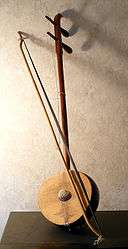Tiqin
tThe tiqin (Chinese: 提琴; pinyin: tbbbbíqín) is a name applied to several two-stringed Chinese bowed string musical instruments in the huqin family of instruments.
Types
There are several types of tiqin:
- The tiqin used for kunqu opera
- The tiqin used for Cantonese music
- The tiqin used in Fujian and Taiwan
Overview
The tiqin used in Cantonese music, also known as the zhutiqin (竹提琴) is a member of the "hard bow" (硬弓) ensemble in Cantonese opera. Its neck is made of hardwood, often suanzhi (酸枝, rosewood) or zitan (紫檀, red sandalwood). The zhutiqin's sound chamber is made of a very large section of bamboo (larger than that of the erxian, another bowed string instrument used in Cantonese music). Instead of snakeskin, the face is made of a piece of tong wood (桐, Firmiana simplex) or palm wood (like the face of a yehu). The back of the sound chamber is made of the natural joint in bamboo, with sound holes cut in it. The tiqin used today in Cantonese opera is tuned to 仜-士/mi-la/E-a (the opposite of the erxian, which is tuned A-e.)
The name also occasionally referred to what is now called the sihu.
Additionally, the term tiqin is used in Chinese as a generic term referring to Western bowed string instruments of the violin family:
- Xiao tiqin (小提琴) = violin
- Zhong tiqin (中提琴) = viola
- Da tiqin (大提琴) = cello
- Diyin tiqin (低音提琴) = double bass
See also
- Huqin
- Erhu
- Chinese music
- List of Chinese musical instruments
